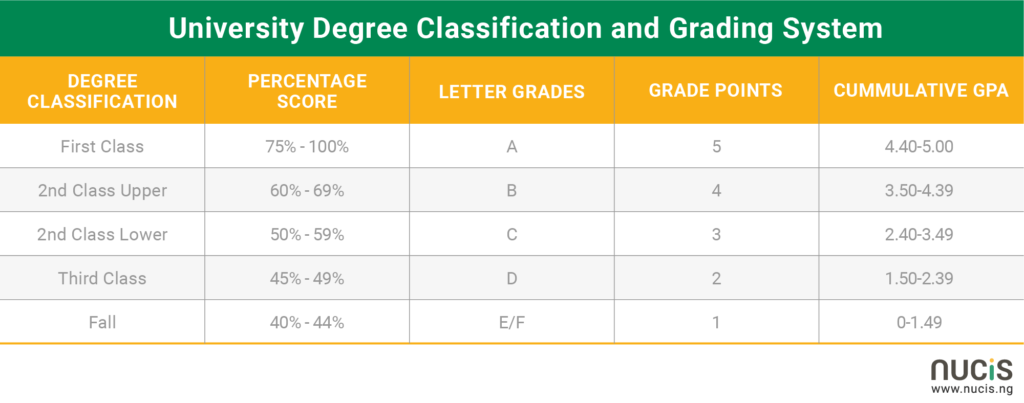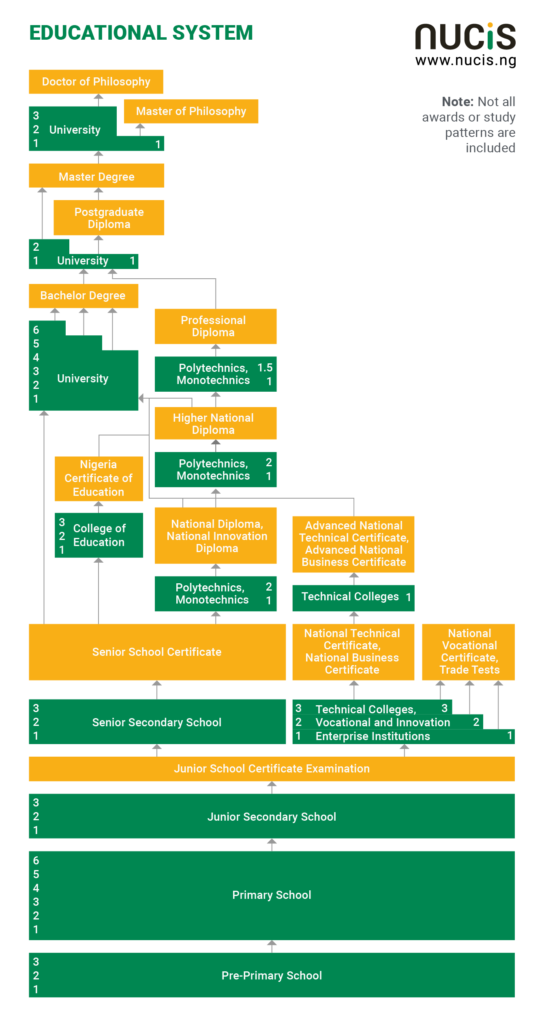University Degree Classification and Grading System
Nigerian universities use a degree classification system that ranks the overall performance of students in bachelor’s degree programs. The degree classification is relevant for graduate admissions and employment prospects.
The NUC recently changed the classification system, eliminating the previously used classification of “PASS”, thereby increasing the GPA requirements for graduation. The new system is increasingly used nationwide, although many institutions have not yet adopted the system as of February 2017. The new NUC classification system and a number of common grading scale variations are outlined below, but classification systems and grading scales may vary greatly from institution to institution.

Navigate Qualifications
Degree Programs
Nigeria’s university system includes an undergraduate bachelor’s degree followed by a master’s degree, and a doctoral degree. The system includes postgraduate diplomas, as well as non-university National Diploma, and Higher National Diploma programs.
Bachelor’s Degree
The standard duration of undergraduate Bachelor programs in Nigeria is four years in most academic disciplines, including sciences, social sciences, and humanities. The most commonly awarded credentials in these fields are the Bachelor of Arts, Bachelor of Science, and Bachelor of Social Science. Most universities use a credit system and require between 120 and 160 credits for four-year programs.
Students may take either a single-subject honors degree, or combined honors.
- For single-subject honors, students study three subjects in the first year, two in the second year, and one in the third.
- In the combined honors program students take three subjects in the first year and two subjects in both the second and third years.
- In the fourth year, single subject honors students take one subject and combined-honors students take at least two subjects.
Programs in engineering- and technology-related fields are typically five years in duration, require between 140 and 170 credits, and conclude with the award of Bachelor of Engineering or Bachelor of Technology degrees.
Graduate Programs
Postgraduate diplomas are non-degree programs awarded upon completion of one year of full-time graduate study after the bachelor’s degree. These programs are offered in a variety of disciplines, although most of them have a more applied rather than research-oriented focus. The postgraduate diploma does not give access to doctoral programs, which typically require a master’s degree for admission.
The most commonly awarded master’s degrees are the Master of Arts and Master of Science. Admission requirements can vary, but most universities require a First or Second Class bachelor’s degree for admission. (See classification system below.) Programs are either one or two years in length. Two year programs typically require a thesis, while one-year programs are generally only course-work-based.
The Master of Philosophy is a short, advanced research degree. It is required by some universities for admission into doctoral programs. Programs are either completely research-based or include coursework in addition to research. Coursework completed in M.Phil. Programs can usually be transferred into doctoral programs.
The standard doctoral degree is the Doctor of Philosophy. It is a research degree that takes three years of study beyond the master’s or M.Phil. degree. Completion of the program requires a dissertation and oral defense. Some programs may also include a limited amount of coursework.
Professional Degrees
First professional degrees in medicine, dentistry, and veterinary science are six years in length and usually require completion of a clinical internship. The standard credentials in these disciplines fulfill the academic requirements for professional licensure in Nigeria, and include the Bachelor of Medicine, Bachelor of Surgery, Bachelor of Dental Surgery, and Doctor of Veterinary Medicine.
The Bachelor of Architecture is a five-year entry-to-practice degree. Bachelor of Law degrees can be either four or five years in length, depending on the institution.
Teacher Education
Teachers in the basic education sector are required to have a Nigerian Certificate of Education (NCE) awarded by one of Nigeria’s teacher training colleges. Admission to the three-year NCE programs requires the Senior Secondary School Certificate and adequate scores in a matriculation test, called the “Monotechnics, Polytechnics and Colleges of Education” exam (MPCE), that is administered by Nigeria’s Joint Admissions and Matriculations Board (JAMB). Some programs include an in-service teaching internship.
Teachers at senior secondary level must have university training. Students can earn either a Bachelor of Education degree or a Postgraduate Diploma in Education following a Bachelor’s degree in another discipline.
Technical and Vocational Education
Higher technical and vocational education is provided at technical colleges, polytechnics, and monotechnics. Entry into these institutions is based on the JAMB-MPCE exam combined with results from upper secondary school. There are two main qualifications:
- The National Diploma (ND) is a two-year program that combines theoretical instruction with practical training. Many programs include a mandatory industrial placement component.
- The Higher National Diploma (HND) is the second stage of education at technical colleges, polytechnics, and monotechnics. It follows the ND, which is typically required for admission. The program is two years in length, theoretical instruction is at a higher level than at the ND level, and there is usually less emphasis on practical training. The HND gives students access to some Postgraduate Diplomas at universities.
In addition to the ND and HND, colleges and specialized training institutes offer programs in nursing and allied health fields. The Nursing & Midwifery Council of Nigeria awards the Certificate of Registration in Nursing upon completion of a three-year training program at nursing schools. The certificate entitles holders to practice nursing in Nigeria. Upon one additional year of study in midwifery, the Council also awards a Certificate of Registration in Midwifery. The Institute of Medical Laboratory Technology awards the Associate Diploma of Medical Laboratory Technology and the Fellowship Diploma on the basis of 4+1 years of postsecondary education.

